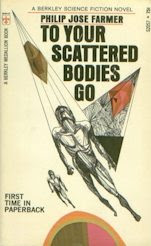This year's Hugo Award nominees for Best Novel
Anathem by Neal Stephenson (Morrow; Atlantic UK)
The Graveyard Book by Neil Gaiman (HarperCollins; Bloomsbury UK)
Little Brother by Cory Doctorow (Tor Teen; HarperVoyager UK)
Saturn's Children by Charles Stross (Ace; Orbit UK)
Zoe's Tale by John Scalzi (Tor)
Monday, March 23, 2009
Friday, March 20, 2009
To Your Scattered Bodies Go by Philip Jose Farmer :: Aaron's Book of the Week
 Continuing our tribute to Philip Jose Farmer, the Book of the Week is the first paperback printing of Farmer's most famous novel, To Your Scattered Bodies Go.
Continuing our tribute to Philip Jose Farmer, the Book of the Week is the first paperback printing of Farmer's most famous novel, To Your Scattered Bodies Go.In To Your Scattered Bodies Go, everyone who ever lived on Earth has been resurrected by an unknown power on another planet. Everyone awakes simultaneously on the banks of a huge, world-encircling river. The novel's title is taken from John Donne's 7th Holy Sonnet, concerning resurrection:
At the round earth's imagin'd corners, blow
Your trumpets, angels, and arise, arise
From death, you numberless infinities
Of souls, and to your scattered bodies go.
This fascinating premise allowed Farmer to bring together whatever historical figures he found most interesting in a single story. Farmer explored the concept through four further volumes, collectively called the Riverworld Series. To Your Scattered Bodies Go won the Hugo Award for Best Novel of 1971.
Friday, March 13, 2009
Aaron's Story Recommendation of the Week :: Eros, Philia, Agape by Rachel Swirsky
 My story recommendation of the week is for "Eros, Philia, Agape" by Rachel Swirsky, (illustration by Sam Weber) published on-line at Tor.com.
My story recommendation of the week is for "Eros, Philia, Agape" by Rachel Swirsky, (illustration by Sam Weber) published on-line at Tor.com.In our world, it is usually futile for women to try to change the basic nature of the men in their lives. But what if they could? In "Eros, Philia, Agape," Adriana purchases a male robot whose consciousness is programmed to shift to create a personality that best meets Adriana's desires. The program works very well. Despite her emotional scars from an abusive childhood, Adriana soon falls in love with, emancipates, marries, and begins a family with her ideal man.
It is no surprise that things don't turn out quite as Adriana intends, yet the flow of the story is subtle. Swirsky is not using her science fictional set-up to hammer home any particular message; rather, she is giving us a new framework to consider universal issues about identity and love and marriage and family and parenting.
This is a story Isaac Asimov might have written, if only he had been an amazing prose stylist. "Eros, Philia, Agape" is beautifully written throughout (once you're past the slightly pretentious title anyway) and I strongly recommend it.
I first encountered Rachel Swirsky with her powerful story "The Debt of the Innocent" in Glorifying Terrorism. She has only been publishing fiction for some three years, but in that time has appeared in Weird Tales, Interzone, Subterranean and Fantasy among other publications, and has already built up a solid body of work. Check her out!
Labels:
2009,
novelette,
Rachel Swirsky,
story recommendations,
Tor.com
Friday, March 06, 2009
Aaron's Magazine of the Week :: Startling Stories August 1952
 We begin our tribute to the late Philip Jose Farmer with his first published story. The Magazine of the Week is the August 1952 issue of pulp magazine Startling Stories, containing Philip Jose Farmer's "The Lovers" (cover art by Earle Bergey). This copy was signed by Farmer on the story's 50th anniversary, the party for which a book club buddy was able to attend.
We begin our tribute to the late Philip Jose Farmer with his first published story. The Magazine of the Week is the August 1952 issue of pulp magazine Startling Stories, containing Philip Jose Farmer's "The Lovers" (cover art by Earle Bergey). This copy was signed by Farmer on the story's 50th anniversary, the party for which a book club buddy was able to attend."The Lovers" caused an instant sensation, and garnered Farmer a Hugo Award for Most Promising New Talent (a short-lived Hugo category, since replaced by the John W. Campbell Award for best new writer). "The Lovers" was influential because it was one of the earliest works of science fiction to address issues of sexuality in an open and frank matter. This story was thus an important step in the development of the SF genre into a mature branch of literature (even if not everybody yet recognizes it as such).
After the success of "The Lovers," Philip Jose Farmer went on to publish over 75 books. BOTW has featured him twice before, for Fire and the Night and Venus on the Half-Shell. Next week, we will continue our tribute to Farmer with his single most famous book.
Subscribe to:
Comments (Atom)
